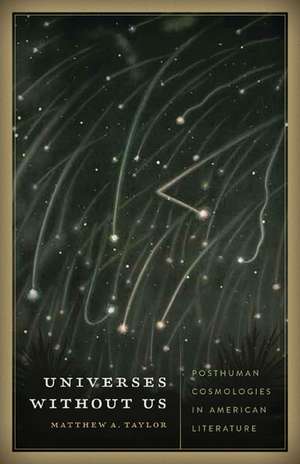Universes without Us: Posthuman Cosmologies in American Literature
Autor Matthew A. Tayloren Limba Engleză Paperback – 13 dec 2013
During the nineteenth and early twentieth centuries, a wide variety of American writers proposed the existence of energies connecting human beings to cosmic processes. From varying points of view—scientific, philosophical, religious, and literary—they suggested that such energies would eventually result in the perfection of individual and collective bodies, assuming that assimilation into larger networks of being meant the expansion of humanity’s powers and potentialities—a belief that continues to inform much posthumanist theory today.
Universes without Us explores a lesser-known countertradition in American literature. As Matthew A. Taylor’s incisive readings reveal, the heterodox cosmologies of Edgar Allan Poe, Henry Adams, Charles Chesnutt, and Zora Neale Hurston reject the anthropocentric fantasy that sees the universe as a kind of reservoir of self-realization. For these authors, the world can be made neither “other” nor “mirror.” Instead, humans are enmeshed with “alien” processes that are both constitutive and destructive of “us.” By envisioning universes no longer our own, these cosmologies picture a form of interconnectedness that denies any human ability to master it.
Universes without Us demonstrates how the questions, possibilities, and dangers raised by the posthuman appeared nearly two centuries ago. Taylor finds in these works an untimely engagement with posthumanism, particularly in their imagining of universes in which humans are only one category of heterogeneous thing in a vast array of species, objects, and forces. He shows how posthumanist theory can illuminate American literary texts and how those texts might, in turn, prompt a reassessment of posthumanist theory. By understanding the posthuman as a materialist cosmology rather than a technological innovation, Taylor extends the range of thinkers who can be included in contemporary conversations about the posthuman.
Universes without Us explores a lesser-known countertradition in American literature. As Matthew A. Taylor’s incisive readings reveal, the heterodox cosmologies of Edgar Allan Poe, Henry Adams, Charles Chesnutt, and Zora Neale Hurston reject the anthropocentric fantasy that sees the universe as a kind of reservoir of self-realization. For these authors, the world can be made neither “other” nor “mirror.” Instead, humans are enmeshed with “alien” processes that are both constitutive and destructive of “us.” By envisioning universes no longer our own, these cosmologies picture a form of interconnectedness that denies any human ability to master it.
Universes without Us demonstrates how the questions, possibilities, and dangers raised by the posthuman appeared nearly two centuries ago. Taylor finds in these works an untimely engagement with posthumanism, particularly in their imagining of universes in which humans are only one category of heterogeneous thing in a vast array of species, objects, and forces. He shows how posthumanist theory can illuminate American literary texts and how those texts might, in turn, prompt a reassessment of posthumanist theory. By understanding the posthuman as a materialist cosmology rather than a technological innovation, Taylor extends the range of thinkers who can be included in contemporary conversations about the posthuman.
Preț: 124.03 lei
Preț vechi: 170.02 lei
-27% Nou
Puncte Express: 186
Preț estimativ în valută:
23.73€ • 24.84$ • 19.75£
23.73€ • 24.84$ • 19.75£
Carte indisponibilă temporar
Doresc să fiu notificat când acest titlu va fi disponibil:
Se trimite...
Preluare comenzi: 021 569.72.76
Specificații
ISBN-13: 9780816680610
ISBN-10: 0816680612
Pagini: 264
Ilustrații: 4
Dimensiuni: 140 x 216 x 20 mm
Greutate: 0.31 kg
Ediția:New.
Editura: University of Minnesota Press
Colecția Univ Of Minnesota Press
ISBN-10: 0816680612
Pagini: 264
Ilustrații: 4
Dimensiuni: 140 x 216 x 20 mm
Greutate: 0.31 kg
Ediția:New.
Editura: University of Minnesota Press
Colecția Univ Of Minnesota Press
Notă biografică
Matthew A. Taylor is assistant professor of English and comparative literature at the University of North Carolina, Chapel Hill.
Cuprins
Contents
Acknowledgments
Introduction: Immortal Post-Mortems1. Edgar Allan Poe’s Meta/Physics2. Henry Adams’s Half-Life: The Science of Autobiography3. “By an Act of Self-Creation”: On Becoming Human in America4. Hoodoo You Think You Are?: Self-Conjuration in Chesnutt’s The Conjure Woman5. “It Might Be the Death of You”: Hurston’s Voodoo EthnographyCoda: “The Cosmo-Political Party”
NotesIndex
Acknowledgments
Introduction: Immortal Post-Mortems1. Edgar Allan Poe’s Meta/Physics2. Henry Adams’s Half-Life: The Science of Autobiography3. “By an Act of Self-Creation”: On Becoming Human in America4. Hoodoo You Think You Are?: Self-Conjuration in Chesnutt’s The Conjure Woman5. “It Might Be the Death of You”: Hurston’s Voodoo EthnographyCoda: “The Cosmo-Political Party”
NotesIndex
Recenzii
"Universes without Us provides incisive and illuminating readings of a wide range of nineteenth- and early-twentieth-century American literature. This book helps us to reconceive American literature through its compelling connections and intersections and to rethink the place of the human in American literature through its reconstruction of both pessimistic visions of a universe without us in Poe and Adams and potentially more livable posthuman existences through African-American literature." —Paul Gilmore, author of The Genuine Article: Race, Mass Culture, and American Literary Manhood
Descriere
As Matthew A. Taylor’s incisive readings reveal, the heterodox cosmologies of Edgar Allan Poe, Henry Adams, Charles Chesnutt, and Zora Neale Hurston reject the anthropocentric fantasy that sees the universe as a kind of reservoir of self-realization. Taylor shows how posthumanist theory can illuminate American literary texts and how those texts might, in turn, prompt a reassessment of posthumanist theory.
